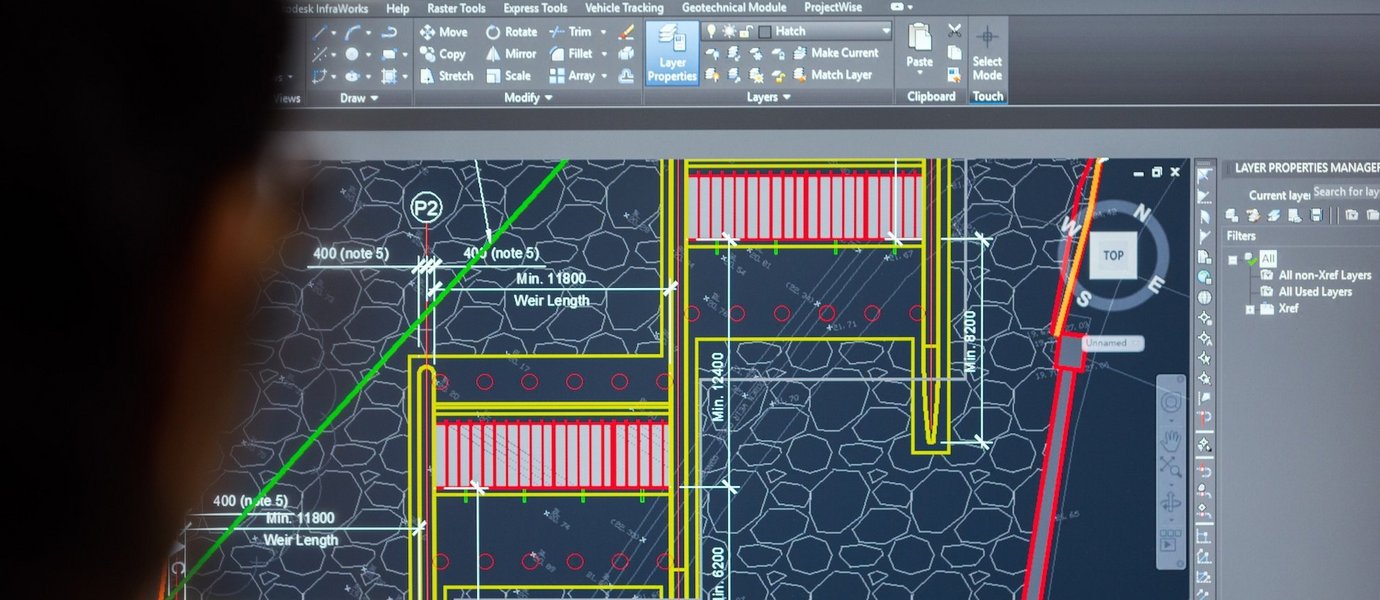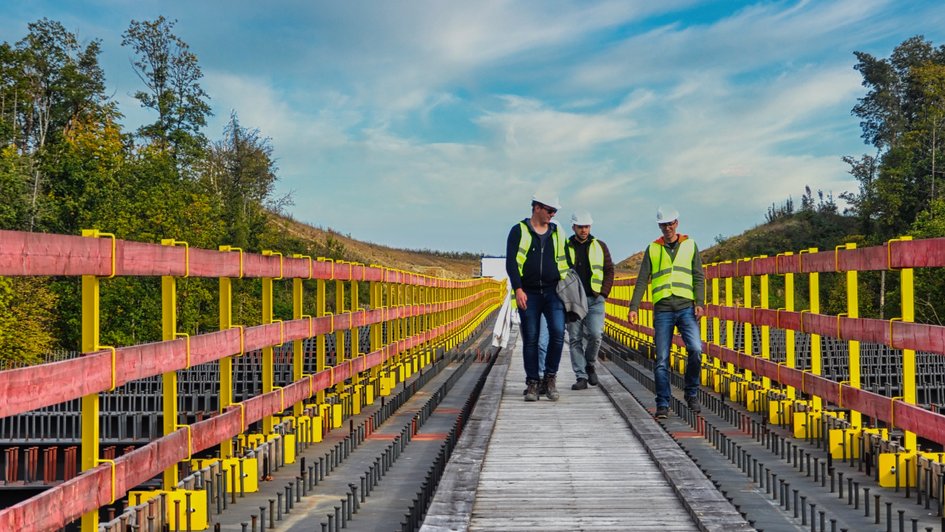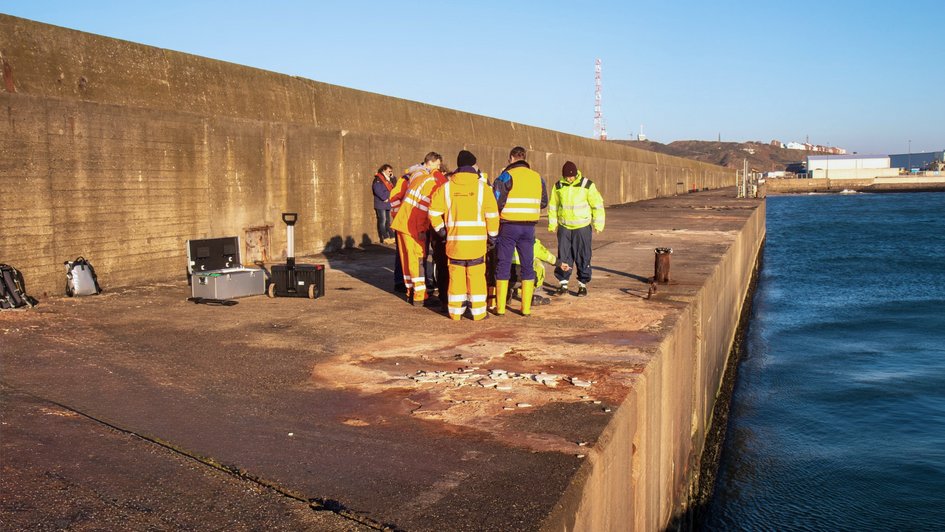Civil engineering
Ailing infrastructure and the demands of climate protection require new structural solutions and creative engineers.
If you have a passion for technology and design and at the same time want to change the world sustainably, then studying Civil Engineering with a specialisation in "Structural Engineering" or "Hydraulic and Civil Engineering" is just right for you. Immerse yourself in an exciting and future-orientated discipline in which innovation, sustainability, economy and the creation of impressive buildings go hand in hand.
Facts at a glance
Think globally. Study locally.
This much is certain - there is always construction going on. Study civil engineering at the Suderburg campus!
To the application (external link, opens in a new window)Civil engineering - the infrastructure specialists
Details of the degree programme
Fields of activity
The future prospects for graduates of the Civil Engineering degree programme are above average. The increasing demand for modern infrastructure projects, sustainable construction and the renovation of old buildings creates a high demand for qualified civil engineers. With a degree in structural engineering or hydraulic and civil engineering, you can work in the construction industry, in engineering offices, in public administration or in research and development departments. You can help develop bridges and high-rise buildings, plan roads and tunnels or specialise in water supply and flood protection. Your expertise is needed to realise infrastructure projects and improve people's quality of life.
Employer
- Engineering offices, building authorities, authorities, water and soil associations, construction companies in building construction, civil engineering and special construction
- Planning and design of structures in building construction and civil engineering, drainage, road construction, flood protection, specialised civil engineering
- Preparation of construction plans and construction drawings
- Advice on structural engineering issues
- Construction management, construction supervision, cost calculation and control, quality assurance
Programme content
Study programme and course content
Civil engineering is a degree programme that enables you to master complex challenges. You will learn to design load-bearing structures, plan and monitor construction projects and find innovative solutions to technical problems. The typical tasks of a civil engineer include calculating loads and stresses, drawing up plans, monitoring construction sites and ensuring compliance with safety standards. You will also learn to use modern technologies such as Computer Aided Design (CAD), Building Information Modelling (BIM), Virtual Reality (VR) and Augmented Reality (AR) to develop more efficient and precise constructions.
Study contents include:
- Reinforced concrete construction, solid construction, steel construction and timber construction
- Strength theory, mechanics and engineering surveying
- Civil engineering design and structural design
- Soil mechanics and foundation engineering
- Construction management principles and construction management
- Hydrology, hydromechanics and hydraulic engineering
- Flood protection and coastal engineering
- Urban water management and sewer operation
- Road planning, construction and traffic engineering
- GIS, BIM, CAD
In addition, there are in-depth modules from the compulsory elective programme.
Programme structure
- 1. until 2nd semester: Fundamentals together with Water and Soil Management (Environmental Engineering)
- 3. to 6th semester: After the core study programme, the in-depth study programme takes place with the possible specialisations "Structural Engineering (structural analysis of beam/surface structures)" or "Hydraulic and Civil Engineering (dams/hydropower plants, waste management)".
- 7. Semester: practical phase, Bachelor's thesis and colloquium
Specialising in structural engineering or hydraulic and civil engineering
Structural Engineering (Structural Analysis of Beam/Surface Structures) *K
The specialisation"Structural Engineering" opens the door to the fascinating world of structural design and construction. Here you will become a specialist in statics and mechanics. You will learn to calculate structures such as bridges, high-rise buildings and hydraulic structures. With your knowledge of materials, load calculations and load-bearing systems, you will be an essential partner in the realisation of construction projects. Structural Engineering offers you the opportunity to develop a solid foundation in the art of construction.
*The modules are labelled "K" inthe study plan.
Hydraulic and civil engineering (dams/hydropower plants, waste management) / *WT
The specialisation"Hydraulic and Civil Engineering" is dedicated to one of the most important resources on our planet - water. Here you will learn to develop sustainable solutions for water supply, flood defence and coastal protection. You will help to ensure that people have access to clean drinking water and are protected from flooding. You will design sewerage systems and hydraulic engineering structures that improve the efficiency of water utilisation and protect the environment at the same time. But road construction is also part of civil engineering and makes you an expert in one of the most important infrastructures in our current mobility.
*The modules are labelled "WT"in the study plan.
Practical learning
The cooperation with companies, the lecturers with their practical experience and students from the civil engineering degree programme in the practical network, who bring their own experience with them, leads to a strongly application-oriented degree programme.
This is supported by state-of-the-art didactic media such as VR glasses, which enable lecturers to make the invisible visible and thus contribute to better understanding. In addition, students can practise everyday tasks such as a reinforcement inspection during their studies.
Your cookie settings have blocked this video.
Study programme with practical experience
In addition to the normal full-time degree programme, we also offer the Civil Engineering degree programme with practical work experience. Alongside your studies, you will be employed as a working student at one of our co-operation partners . Another option is the civil engineering degree programme with practical experience. In this model, training in a construction profession and studying complement each other.
The advantages for you are obvious. You already work in a company alongside your studies. This provides you with in-depth knowledge of the course content, financial security and a secure future. Our timetable is designed so that you spend four days at the university during the lecture period and one day a week working in the company, for example.
After the Bachelor
For graduates who have chosen to specialise in hydraulic and civil engineering , the Master's degree course in Water Management in Global Change in Suderburg is the perfect choice. However, with a Bachelor of Engineering degree from Suderburg, you are also ideally equipped to start a Master's programme in structural engineering at another university.
Study plan
1. Semester 1.1 K/WT Fundamentals of mechanics (1. Semester) The aim of the module is to solve problems relating to central and general force systems, to calculate the support reactions and internal forces of statically determinate systems and to determine the member forces of statically determinate trusses.
1.2 K/WT Fundamentals of hydraulic engineering and hydrology (1. Semester) The aim of the module is to identify key areas of responsibility and interrelationships in the field of hydraulic engineering and water management, to differentiate between fundamental issues in hydraulic engineering and water management, to measure and analyse the various parameters of the water balance and to calculate design parameters for hydraulic engineering and water management tasks.
1.3 K/WT Geoinformation systems GIS / BIM (1. Semester) After successfully completing the module, students will be able to explain the functions and processes of a complex CAD system such as AutoCAD. They will be able to plan and visualise structural and hydraulic engineering designs using a CAD system in 2D and 3D. They will also be able to create construction plans and manage them with IT support. Students are able to use a CAD system in a targeted manner and learn further CAD techniques independently. They can also independently create 3D objects for virtual reality (VR), augmented reality (AR) and building information modelling (BIM). They can also describe the functions and processes of a complex BIM system.
1.4 K/WT Fundamentals of mathematics and statistics (1. Semester) After successfully completing the module, students will be able to explain mathematical and statistical methods and interpret their results. They can demonstrate the possibilities and limitations of these methods and select and apply the appropriate methods for different problems. They are able to solve engineering problems using these methods. Students can work on specific exercises in a team and assess their own abilities. They know when they need external support and where they can find it.
1.5 K/WT Engineering Fundamentals Physics, Chemistry (1. Semester) After successfully completing the module, students will be able to explain physical and chemical methods and calculations and interpret the results. They are able to demonstrate the possibilities and limitations of these methods. Students can calculate estimated solutions for specific tasks and check the plausibility of existing calculations. They are able to select and apply suitable methods for various problems and use them to solve simple engineering problems. They can also assess their own abilities and know when they need external help.
1.6 K/WT Building physics / supporting structure (1. Semester) ..
1.1 K/WT Fundamentals of mechanics (1. Semester) The aim of the module is to solve problems relating to central and general force systems, to calculate the support reactions and internal forces of statically determinate systems and to determine the member forces of statically determinate trusses.
The aim of the module is to solve problems relating to central and general force systems, to calculate the support reactions and internal forces of statically determinate systems and to determine the member forces of statically determinate trusses.
1.2 K/WT Fundamentals of hydraulic engineering and hydrology (1. Semester) The aim of the module is to identify key areas of responsibility and interrelationships in the field of hydraulic engineering and water management, to differentiate between fundamental issues in hydraulic engineering and water management, to measure and analyse the various parameters of the water balance and to calculate design parameters for hydraulic engineering and water management tasks.
The aim of the module is to identify key areas of responsibility and interrelationships in the field of hydraulic engineering and water management, to differentiate between fundamental issues in hydraulic engineering and water management, to measure and analyse the various parameters of the water balance and to calculate design parameters for hydraulic engineering and water management tasks.
1.3 K/WT Geoinformation systems GIS / BIM (1. Semester) After successfully completing the module, students will be able to explain the functions and processes of a complex CAD system such as AutoCAD. They will be able to plan and visualise structural and hydraulic engineering designs using a CAD system in 2D and 3D. They will also be able to create construction plans and manage them with IT support. Students are able to use a CAD system in a targeted manner and learn further CAD techniques independently. They can also independently create 3D objects for virtual reality (VR), augmented reality (AR) and building information modelling (BIM). They can also describe the functions and processes of a complex BIM system.
After successfully completing the module, students will be able to explain the functions and processes of a complex CAD system such as AutoCAD. They will be able to plan and visualise structural and hydraulic engineering designs using a CAD system in 2D and 3D. They will also be able to create construction plans and manage them with IT support. Students are able to use a CAD system in a targeted manner and learn further CAD techniques independently. They can also independently create 3D objects for virtual reality (VR), augmented reality (AR) and building information modelling (BIM). They can also describe the functions and processes of a complex BIM system.
1.4 K/WT Fundamentals of mathematics and statistics (1. Semester) After successfully completing the module, students will be able to explain mathematical and statistical methods and interpret their results. They can demonstrate the possibilities and limitations of these methods and select and apply the appropriate methods for different problems. They are able to solve engineering problems using these methods. Students can work on specific exercises in a team and assess their own abilities. They know when they need external support and where they can find it.
After successfully completing the module, students will be able to explain mathematical and statistical methods and interpret their results. They can demonstrate the possibilities and limitations of these methods and select and apply the appropriate methods for different problems. They are able to solve engineering problems using these methods. Students can work on specific exercises in a team and assess their own abilities. They know when they need external support and where they can find it.
1.5 K/WT Engineering Fundamentals Physics, Chemistry (1. Semester) After successfully completing the module, students will be able to explain physical and chemical methods and calculations and interpret the results. They are able to demonstrate the possibilities and limitations of these methods. Students can calculate estimated solutions for specific tasks and check the plausibility of existing calculations. They are able to select and apply suitable methods for various problems and use them to solve simple engineering problems. They can also assess their own abilities and know when they need external help.
After successfully completing the module, students will be able to explain physical and chemical methods and calculations and interpret the results. They are able to demonstrate the possibilities and limitations of these methods. Students can calculate estimated solutions for specific tasks and check the plausibility of existing calculations. They are able to select and apply suitable methods for various problems and use them to solve simple engineering problems. They can also assess their own abilities and know when they need external help.
1.6 K/WT Building physics / supporting structure (1. Semester) ..
..
4 reasons for civil engineering
- 1.
-
Shaping the future - renewing infrastructure
Outdated bridges, roads or canals? Civil engineers are needed to make society's lifelines safe and modern.
- 2.
-
Versatile career opportunities
Whether high-rise buildings, tunnels, locks or wind farms - the world of civil engineering is diverse and opens up exciting professional fields in planning, management and research.
- 3.
-
Actively implementing sustainability
You develop solutions for environmentally friendly and resource-saving construction.
- 4.
-
Study programme with practical experience (work-study programme)
Also possible as a degree programme with practical involvement with a partner company (work-study programme).
Useful links and files
Good to know
Starting in the summer semester (March)
If you are starting in the summer semester (March), please email our Dean of Studies (opens your email program) in advance to arrange an information meeting, as the programme starts in the second semester.
Starting in the winter semester (September)
We recommend taking part in the respective preliminary courses (external link, opens in a new window) to refresh or deepen your knowledge. Registration is required in advance.
Accommodation
In Suderburg and in the nearby Hanseatic town of Uelzen, there is a wide range of affordable accommodation for our students at the Suderburg campus. The offer ranges from shared rooms to single rooms and flats.


